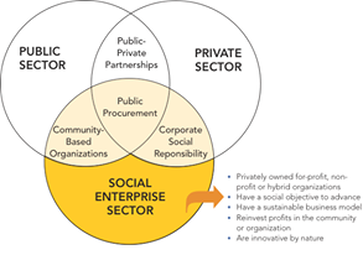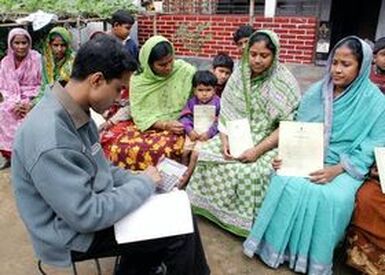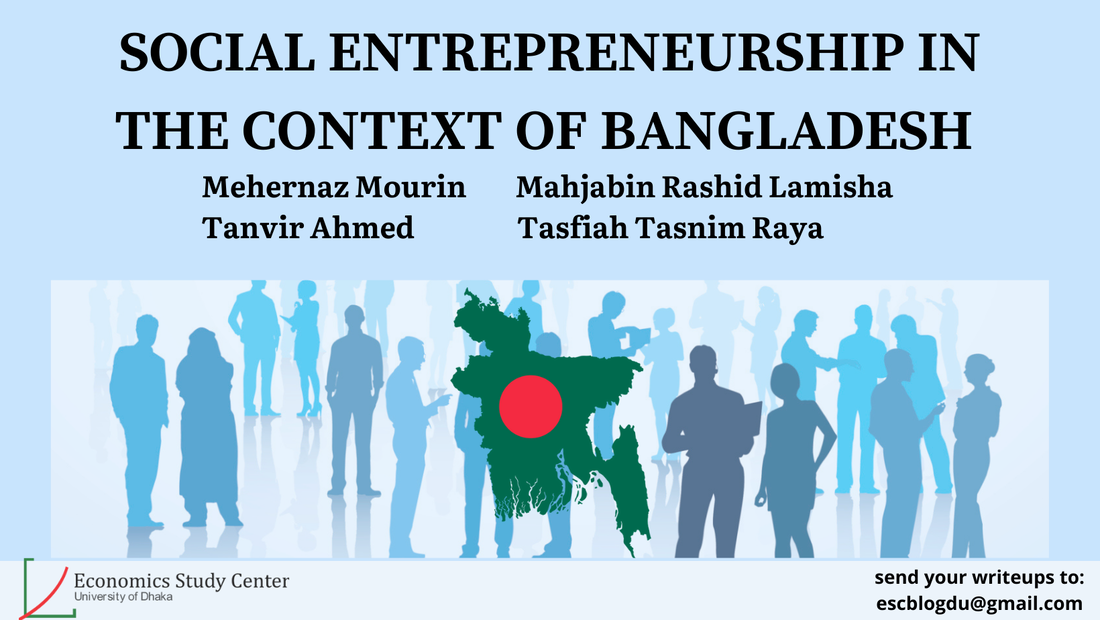ECONOMICS STUDY CENTER, UNIVERSITY OF DHAKA
|
Mehernaz Mourin Mahjabin Rashid Lamisha Tanvir Ahmed Tasfiah Tasnim Raya Entrepreneurship is an important driver of the economy as it brings in unused capital, employs new labor and aims to make a profit in the long run. French economist Jean-Baptiste Say, in the early 19th century, described an entrepreneur as one who “shifts economic resources out of an area of lower and into an area of higher productivity and greater yield.” But a social entrepreneur should not be confused with any other entrepreneur as they function very differently. In the case of social entrepreneurship, individuals try to mark a social problem and address it by employing entrepreneurial principles, process and operations. Non-profit organizations and non-government organizations usually play the role of social entrepreneurs and work to improve the lives of people related to this cause. Acumen defines a social enterprise as “an enterprise that prioritizes transformative social impact while striving for financial sustainability.”  Social entrepreneurship deploys the resources of traditional entrepreneurship with a mission to change society. Dr Muhammad Yunus, who was awarded the Nobel Peace Prize for founding the Grameen Bank, is a prominent example of a social entrepreneur. He is a banker, economist, civil society leader besides being the pioneer of the concepts of microcredit and microfinance. Social entrepreneurship stimulates ideas for more socially viable and sustainable business strategies and organizational forms. Since it contributes directly to the Sustainable Development Goals (SDGs), social entrepreneurship can potentially encourage mainstream corporations to take on greater social responsibility. Importance of Social Entrepreneurship in Bangladesh: With a vision of making effective change, social entrepreneurs try to fix social irregularities and discriminations through their intelligence, hard work, creativity and integrity. The goal of social entrepreneurs is to innovate new and fresh ideas, and implement their plans. They usually do not stick to hard and fast rules or pre-determined concepts; rather, they try to follow their instincts to fulfill their customers’ requirements through innovation. A person aiming to be a successful entrepreneur needs to have a set of skills that are unique, diversified and up-to-date and must be adaptive to the challenges that come along the way.  Source: World Economic Forum Source: World Economic Forum Wide-ranging economic reforms initiated in recent years have restored confidence among enterprises and have induced prospective entrepreneurs to come forward and set up new businesses. There are certain requirements that social entrepreneurs have to fulfill, such as cross compensation, the fee for service, employment and skills training, market intermediary, market connector, independent support, cooperative and many more. Social enterprises don’t necessarily have to be non-profit; they can take any lawful structure and can aim to make profits alongside addressing an existing problem. A popular business management concept, termed as Corporate Social Responsibility (CSR), motivates companies to integrate social and environmental concerns with their business operations and interaction with their stakeholders. Thus, CSR can be instrumental for businesses to take part in charity and philanthropy which can also bring a variety of competitive advantages. The Schwab Foundation identifies the following, among many, characteristics of social entrepreneurs:
 Prospects of Social Entrepreneurship in Bangladesh: Studies by Farouk (1983) and Rahman (1989) identify Bangladeshi entrepreneurs as self-confident, result and future-oriented, innovative, good leaders, and risk-takers. These entrepreneurs use various strategies to deal with social evils such as poverty and unemployment in our country. This can be an economically and socially beneficial factor for a developing country like Bangladesh. ➢ Opportunity for personal welfare and social transformation: Social entrepreneurship in Bangladesh should be targeted to achieve a significant social transmission which would step up the country’s welfare, job creation, and the overall development of the economy. The absolute aim of social entrepreneurship should be moral contentment rather than having accomplishments of materialistic gains. ➢ Integration of marginalized group: At least 30 million marginalized people live in Bangladesh belonging to diverse cultural identities, races, and ethnicities, and they are the victims of socio-political conditions. Social entrepreneurs are playing a vital role in eradicating problems in their lives and improving our country's economic condition. Social entrepreneurs are also working for the upliftment of the marginalized sectors in our country. They meet the needs of the bottom of pyramids in the market, through which these marginalized sectors can collaborate. They advocate for diversity and inclusion on behalf of underrepresented groups and become an engine of inspiration. For instance, Physically-challenged Development Foundation (PDF) - an organization founded by Mizanur Rahman Kiron works towards helping disabled youths in Bangladesh. ➢ Excellent mobilization of social capital: The significant contribution of social entrepreneurs is the creation of social capital. Social capital plays a vital role in a country's development. They create jobs within the communities they care about by hiring local people, training them to hold a job within or outside the enterprise. ➢ Collaborative participation with Bangladesh government: There is plenty of scope for collaboration between the government and social enterprises in Bangladesh to address the existing social problems. There is still a vast untapped opportunity to develop social entrepreneurship with the government’s support.  A Grameen Bank meeting in Bangladesh. Reuters A Grameen Bank meeting in Bangladesh. Reuters Examples of Social Entrepreneurship in Bangladesh BRAC and Grameen Bank have played a revolutionary role in popularizing social enterprises of Bangladesh. BRAC is the largest collaborative network of social business in the world. It was established by Sir Fazle Hasan Abed in 1972 after the independence of Bangladesh. It is present in all 64 districts of Bangladesh as well as 11 other countries in Asia, Africa, and the Americas. From the very beginning, BRAC has integrated health, finance, and education programs in 70,000 villages, reaching an estimated 75% of the entire population. BRAC's social entrepreneurship program reaches medical nursing, schools, craft markets, milk and cattle farming, and microcredit. Aarong, a BRAC social venture, supports 65,000 rural artisans by introducing their products to the larger urban markets. BRAC initiated an informal school system in 2007 which not only included 20,000 pre-primary schools, 32,000 primary schools, and 2000 secondary schools but also created a huge job opportunity, particularly for women. BRAC started offering microloans to poor women for cattle rearing in 1990. Since then, the poultry and livestock sector has evolved to 2.1 million workers at present. Its sericulture program, established in 2007, employs more than 7500 silk rearers and 5800 spinners. BRAC’s innovation and diversity are exemplary for prospective entrepreneurs. Similarly, Grameen Bank offers small loans to impoverished, rural people without any collateral. As of January 2011, among the 7.5 million borrowers of Grameen Bank, 97% were women. While women empowerment in our country has a long way to go, Grameen Bank is leading the path facilitating women’s participation in the workforce as skilled. Do Social Entrepreneurs Focus on Earning Money? The answer to this question varies from enterprise to enterprise. In many cases, social entrepreneurs do make money but they primarily work for the betterment of the society to have a positive impact on its stakeholders. However, in some cases, the entrepreneurs choose not to keep any profit for themselves at all. Taaluma Totes, which produces socially responsible fabric bags, provides 20% of its profit as microloans to the farmers and small business owners from whom the fabric is sourced. Love You Melon, which sells beanies and hats, has a new campus crew program that mobilizes students across the United States to help with its mission, in addition to donating 50% of its profits to pediatric cancer research and supporting patients. "Pashe Achi Initiative'' is a non-profit youth organization founded by a group of altruistic students of the Department of Economics, University of Dhaka. Their ventures include supporting the booksellers of Nilkhet, who were affected by the COVID-19 lockdown, by delivering their books to the mass market at a modest price. Aravind Eye Care is a social enterprise that provides eye care to people at an affordable price. There is room for a great deal of improvement in the healthcare sector of Bangladesh. This can be a good place for social entrepreneurs to make a positive impact . In a developing country like Bangladesh, among the wide range of barriers that social entrepreneurs have to overcome to accomplish their goals, limited financial assistance is the most prominent. Banks and other financial institutions don’t show much interest in such types of ventures, and this limits opportunities for the young entrepreneurs. Numerous studies suggest a rise of the social entrepreneurship sector in Bangladesh. It is expected to be a leading source of job creation, with higher turnovers. The government needs to enact policies that are value based and formulate strategies that groom at the root levels. It is necessary to provide a safe and secure environment for entrepreneurs who would pave the way towards a sustainable economy by attracting investors from both home and abroad. REFERENCES:
1 Comment
4/18/2023 04:28:05 pm
Reply
Leave a Reply. |
Send your articles to: |





